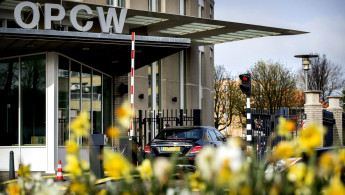Chemical inspectors allowed into Douma amid probe tampering warnings
International investigators entered Douma on Tuesday to investigate an alleged chemical attack, amid warnings that crucial evidence had been tampered with.
The suspected chemical attack in Eastern Ghouta saw at least 49 people die according to medical groups and rescuers, with other estimates reaching over a hundred.
Graphic images and videos emerged on social media following Douma's alleged gas attack, showing children struggling to breathe and entire families who had succumbed to the attack on the floors of underground shelters.
The US, UK and France launched punitive strikes against the Syrian regime on Saturday in response to alleged chemical weapons attack that President Donald Trump branded the "crimes of a monster".
"Experts from the chemical weapons committee entered the town of Douma," state news agency SANA wrote, referring to the Organisation for the Prohibition of Chemical Weapons (OPCW).
The inspectors arrived in Damascus on the day of the Western strikes but had not been allowed to enter Douma.
France and the United States appeared to question the purpose of such a mission.
"It is highly likely that evidence and essential elements disappear from the site, which is completely controlled by the Russian and Syrian armies," the French foreign ministry said.
Russian foreign ministry spokeswoman Maria Zakharova hit back, calling the accusation "very surprising" and saying that Russia had supported the inspection.
Several experts have said any investigation at this stage was likely to be inconclusive.
"As with any crime scene, it is crucial to get there as soon as possible," said Olivier Lepick, a fellow at the Paris-based Foundation for Scientific Research.
"If the Russians and Syrians have nothing to hide, it's strange that they would wait 36 to 72 hours," he said. "It's probably to give themselves the time to finish cleaning up."
French President Emmanuel Macron said that the Saturday’s strikes had been "for the honour of the international community".
"These strikes don't necessarily resolve anything but I think they were important," Macron added.
Yesterday, Britain’s embassy to the Netherlands said Russia and Syria had not yet allowed a team from the Organisation for the Prohibition of Chemical Weapons (OPCW) to enter Eastern Ghouta.
The head of the global watchdog Ahmet Uzumcu, briefed emergency talks about the deployment of the team which arrived in Damascus Saturday.
But "Russia and Syria have not yet allowed access to Douma. Unfettered access essential," the British delegation based in The Hague said in a tweet.
US ambassador Ken Ward said on Monday that Russia may have visited the site and "tampered with" the evidence.
"We are concerned they may have tampered with it with the intent of thwarting the efforts of the OPCW fact-finding mission to conduct an effective investigation," he added in his speech.
If proven this would raise "serious questions" about the ability of the fact-finding mission to do its job, he added.
Ward called on the 41-member governing body of the OPCW "to condemn the Syrian government for its reign of chemical terror and demand international accountability for those responsible for these heinous attacks."
He also urged Syria to "end this charade," "immediately cease all" such attacks and "immediately declare and dismantle all aspects of its chemical weapons program."
The Kremlin hit back at the "groundless" allegations. President Vladimir Putin’s spokesperson Dmitry Peskov said, "we consider such accusations against Russia to be groundless," adding that Moscow was in favour of an "impartial investigation".
Russia has vowed not to interfere in OPCW’s work and have criticised the US-led strikes on three facilities in Syria as a bid to "undermine the credibility" of the mission.





 Follow the Middle East's top stories in English at The New Arab on Google News
Follow the Middle East's top stories in English at The New Arab on Google News
![The UAE is widely suspected of arming the RSF militia [Getty]](/sites/default/files/styles/image_330x185/public/2024-11/GettyImages-472529908.jpg?h=69f2b9d0&itok=Yauw3YTG)
![Netanyahu furiously denounced the ICC [Getty]](/sites/default/files/styles/image_330x185/public/2024-11/GettyImages-2169352575.jpg?h=199d8c1f&itok=-vRiruf5)
![Both Hamas and the Palestinian Authority welcomed the ICC arrest warrants [Getty]](/sites/default/files/styles/image_330x185/public/2024-11/GettyImages-2178351173.jpg?h=199d8c1f&itok=TV858iVg)